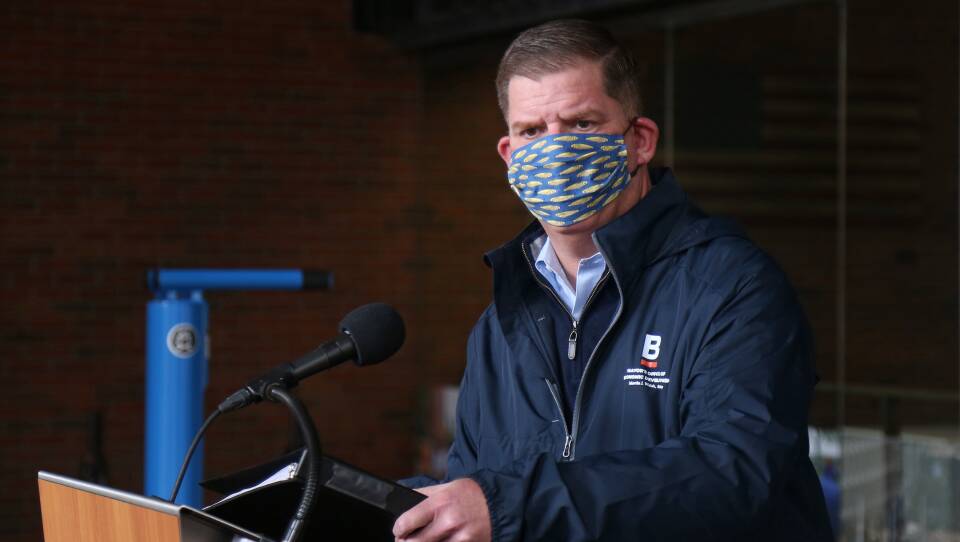Updated at 12:30 p.m.
Boston Mayor Marty Walsh is demanding the MBTA’s Fiscal Control Board reconsider plans to cut T services, including bus and subway runs, in order to balance the agency’s budget after a significant revenue loss due to the COVID-19 pandemic.
Speaking ahead of a meeting of MBTA management Monday, and joined by other elected officials and union representatives, Walsh said the cuts are short-sighted. With a transit-friendly Biden administration assuming office and as vaccines for COVID-19 appear to be around the corner, Walsh said the public will need the transit more than ever.
“The MBTA is an essential service here in Boston, ….[and] an essential service in the commonwealth of Massachusetts,” Walsh said. “The budget challenges are real and significant, but moving forward with service cuts especially right now hurts our residents ... and it will hurt our city’s ability to recover from this pandemic.”
Walsh said the cuts would disproportionately hurt working class and lower-income riders, and the very workers who need the T most and who have worked essential jobs throughout the pandemic.
“These cuts would hurt low-income workers [and... ] subway service for late-night workers people who do not own a car … essential workers keeping our city running,” Walsh said.
City Council President Kim Janey joined the mayor’s call, saying the proposed cuts “undermine the needs of our essential workers and the sacrifices they are making to protect our communities.”
“Access to public transit is important,” said Janey. “We are in the midst of the second surge of a global pandemic, and we are more reliant now than ever on essential workers in our communities, many of whom depend on public transit and need it to be reliable, accessible and affordable.”
And, Janey said, the cuts will only exacerbate existing inequities in access to reliable transportation for working-class communities and essential workers.
“It is no secret that there are large gaps in service in lower-income communities of color. These communities are under-served,” Janey added.
Janey also suggested, as have others, that promises by MBTA officials that service cuts will be temporary lack credibility.
“So-called temporary cuts have had significant long-term impacts in the past, and beg the question: When will services be brought back?” Janey said. “The answer? Probably never.”
At the start of the board meeting, MBTA General Manager Steve Poftak announced that he would suggest deferring some critical decisions on the service cuts until February, when the agency formally embarks on its fiscal year 2022 budgeting process.
He did not say specifically what portions of the wide-ranging plan might be delayed or reconsidered, though members of the Fiscal and Management Control Board plan to discuss the topic later on Monday after an executive session to discuss collective bargaining.
"I've made the following request of staff and I make the following recommendation to the board: that we defer the presentation of the initial round of potential service reductions to next week's meeting, that we continue to work with our labor stakeholders to determine the best ways to reduce costs and preserve the resiliency of the MBTA, and that we potentially defer some decisions on service to the FY22 budget process where it's feasible for us to have that flexibility," Poftak said.
State House News Service contributed to this article




